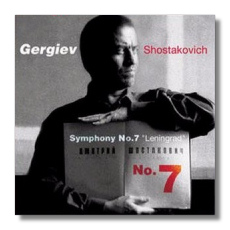
The Internet's Premier Classical Music Source
Related Links
- Shostakovich Reviews
- Latest Reviews
- More Reviews
-
By Composer
-
Collections
DVD & Blu-ray
Books
Concert Reviews
Articles/Interviews
Software
Audio
Search Amazon
Recommended Links
Site News
 CD Review
CD Review
It is unexplained why two orchestras are credited here. I expect musicians from both orchestras took part in this live recording, which was made in Rotterdam in September 2001. It certainly doesn't sound like 160 musicians are playing, though. In fact, this "Leningrad" is notable for its clear, airy orchestral textures.
This symphony was first performed in 1942 – in the middle of the German siege on Leningrad – and it is useful to remember that most, if not all, of the musicians (including, I think, Gergiev himself) were not even alive at that time. In fact, soon Russian orchestras will be filled with players who never even knew Communism first-hand! As performers identify with this symphony's historical background less and less, how will performances change? Already, I feel that Gergiev – perhaps a harbinger of things to come – is moving away from specificity and towards universality. His "Leningrad" is less about the tribulations and ultimate triumph of Leningrad over German occupation than about any population's victory over adversity. The booklet notes fall into line with Solomon Volkov's revisionist Testimony in interpreting this symphony more generally, but I feel we still have some distance to go: we must stop hearing Shostakovich's music as political history and start hearing it as music.
When one does so, it becomes possible to be objective about this symphony's faults and virtues alike. The rampaging "invasion music" in the first movement and the eardrum-shattering climax in the last are not next exactly in the best taste. To his credit, Gergiev doesn't linger over the symphony's most bombastic pages, nor does he apologize for them – he simply plays them as music and lets the listener draw his or her own conclusions. Gergiev's tempos are not particularly fast, but he conducts this score with a welcome efficiency, a leanness that helps to counter the tendency towards bombast. This is a recording to hear if you want to give the "Leningrad" one more chance, not if you want to have your worst fears confirmed!
Not everything is perfect here. The violins sound harsh and glassy. Is this because of the engineering – huge dynamic range notwithstanding – or a result of two ensembles being put together without time to achieve an ideal blend? There are better-played recordings of this symphony to be had (Bernstein's Chicago reading, for one, and Haitink's). I also think listeners should hear, at least once, a member of the old guard: Mravinsky, Rozhdestvensky, Svetlanov, or Barshai. Still, Gergiev is more than acceptable, and this recording might be a good compromise for those who cannot choose between authenticity and modern sound.
Copyright © 2003, Raymond Tuttle



















